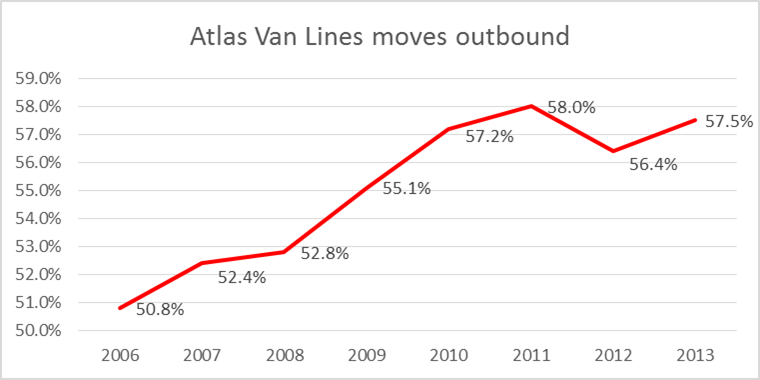Illinois has second-highest rate of outbound migration in country
Why do moving companies love Illinois politicians? Because they keep a heavy traffic flow moving out of Illinois. At the end of each year, moving companies release annual migration trends data based upon a compilation of customers who move in and out of different states. United Van Lines is the largest mover in the country,...
Why do moving companies love Illinois politicians?
Because they keep a heavy traffic flow moving out of Illinois.
At the end of each year, moving companies release annual migration trends data based upon a compilation of customers who move in and out of different states. United Van Lines is the largest mover in the country, and its 2013 study showed that Illinois had the second-highest rate for outbound traffic. The company’s moving data, along with the data of competitor Atlas Van Lines, add to the story of the Great Recession and Illinois’ tax-hiking response. Moving data provide the most updated story about migration as it comes out a year ahead of census data, and two years ahead of Internal Revenue Service data.
Source: unitedvanlines.com and atlasvanlines.com
These data show the percent of total migratory traffic that is moving out of the state. For example, a 60 percent outbound rate means that three out of every five migrants leave, while the other two come in. If the rate is above 50 percent, then the state has net outflow. According to United Van Lines, Illinois had the second-highest rate of out-migration in 2013, and consistently ranks in the five worst states for outflow nationally.
Policy failures have destroyed job creation and entrepreneurship, which has driven the exodus of residents. The state has the fourth-highest unemployment rate nationally, and ranks last in projected job creation. Bewildered political leaders can think of nothing better to do than hand out tax breaks to big corporations and filmmakers. But what the state needs are common sense reforms to address the problems that are driving people and businesses away, including:
- Second-highest property taxes nationwide
- Fourth-highest workers’ compensation costs in the country
- Ninth-highest regulatory burden in the U.S.
- Ninth-highest overall tax burden nationwide
- Forced unionism
Outflow rates spiked after the 2011 income tax hike. Both United Van Lines and Atlas Van Lines data show an increase in the rate of outflow for the first year of the tax hike, and continuing elevated rates going forward.
It would seem that Illinois’ experiment with bad economic policy of taxation and regulation has gone far enough, but Springfield is preparing for an encore performance.
The progressive tax hike being promoted by some state lawmakers would slam the state’s business tax climate down 13 places to 44th best in the nation. Moving companies can tell us what will happen after a progressive tax, but it would be better if voters tell the politicians to take a hike instead.



